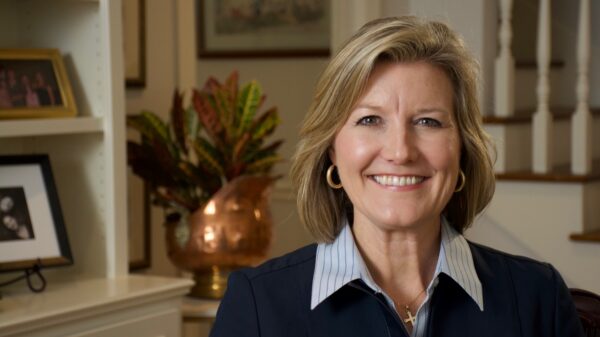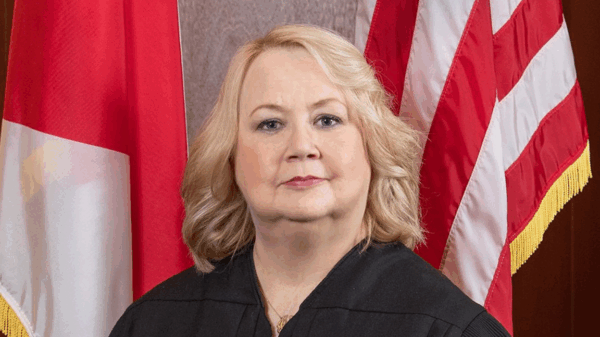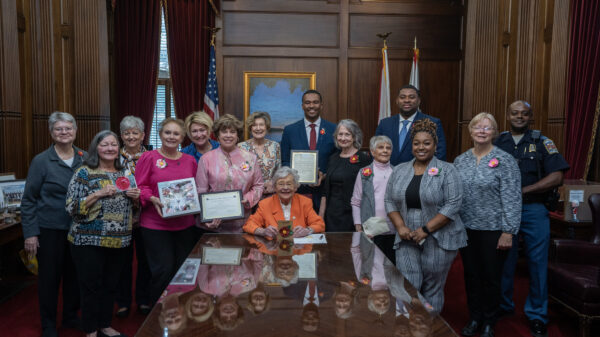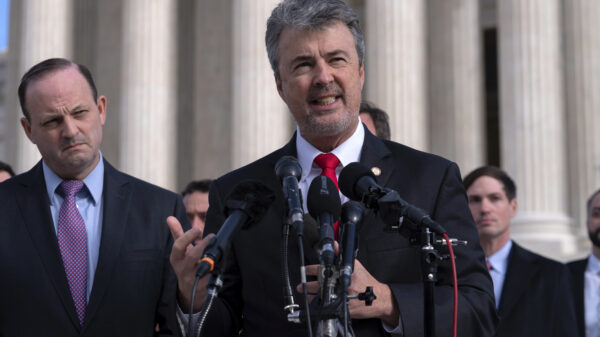By Chip Brownlee
Alabama Political Reporter
Sen. Phil Williams, who has prefiled a “bathroom bill” known as the Alabama Privacy Act, believes it has been misinterpreted as requiring bathroom “police” to monitor users’ gender in every restroom in the State.
“One of the complete fabrications or misinterpretations about the bill is that it requires an attendant to be in the bathroom, checking people’s gender, giving them permission to use the facilities and so on,” Williams said in an exclusive interview with APR. “It requires there to be a staff person whose job it is to address the public concern. You will have to have that or you will face civil penalties.”
SB1, which will be debated in the upcoming 2017 Legislative Session, will only affect businesses that have outlined official transgender-friendly bathroom policies that allow anyone, irrespective of their gender, to use any restroom at any time, Williams said. Businesses and entities that have not outlined any official policies or entities that have single-stall gender-neutral restrooms won’t be affected, he said.
The bill states entities that have restrooms, bathrooms or changing facilities that are designed to be used by multiple individuals at once, “irrespective of their gender,” must have those restrooms “staffed by an attendant stationed at the door of each restroom to monitor the appropriate use of the restroom and answer any questions or concerns by users.”
The “attendant” can be anyone employed by the business who, in an officially designated role, handles any questions or concerns about the use of their transgender-friendly restrooms, Williams said. The staff person can be dual-headed, but must make sure the public has a place to go if there is an “incident” or any “deep-seated concern.”
Williams, a Republican from Rainbow City, said the concern could occur on either side of the ideological debate over transgender bathrooms.
Last year, North Carolina Republican lawmakers passed the first “bathroom bill,” igniting debate nationwide over which restrooms transgender individuals should use. The bill’s passage prompted a firestorm.
North Carolina’s House Bill 2, dubbed the Public Facilities Privacy and Security Act, is more clear-cut than Williams’ SB2, even though the two share similar names and similar purposes. HB2 states that transgender individuals must use the bathroom that corresponds with their biological sex as stated on their birth certificate when using public restrooms. Williams’ bill does not define gender and doesn’t regulate restrooms based on biological sex.
North Carolina’s bill inspired boycotts that cost taxpayers in the State millions of dollars in lost tax revenue and more from lost economic development. Later, it drew lawsuits from the US Department of Justice and prompted President Barack Obama’s administration to issue a fierce directive enjoining public schools to allow transgender access to restrooms. That directive has since been stalled by a Federal Court in Texas.
Since then, debate over the issue has done nothing but crescendo. Yesterday, several conservative legal groups filed amicus curiae briefs in G.G. v. Gloucester County School Board, a pending US Supreme Court case that will determine whether gender identity can be included in Federal sex discrimination law.
The aftermath of HB2’s failed implementation prompted Williams and Republicans across the nation to develop their own, more diluted forms of the bill. Williams’ bill accompanies others like it in states like Texas, Virginia and Kansas.
In Alabama, people have a right to privacy and security under State law, Williams said. Businesses like Target and Planet Fitness — businesses that have explicitly outlined official transgender-friendly bathroom policies — must make sure that they are addressing the concerns of every person, not just a certain group, Williams said.
“How do they enact those policies with a complete disregard for the vast majority of the citizens who use the same facilities, who have a right to privacy and security?” Williams said “They don’t even bother to address it. They just assume that everybody will step aside and take their lumps. My bill comes at it from that standpoint.”
Williams said his bill, which has been maligned by many as anti-LGBTQ, has been misinterpreted. According to him, it does not prohibit transgender people from using the restroom they choose, and, in fact, it gives them the same opportunity to have their concerns addressed if they have issues in a transgender-friendly restroom.
“It can be somebody who is straight who wants to know why their 3-year-old daughter saw a man with a dress and a beard in the women’s room,” he said. “Or, it might be, for that matter, someone who is a transgender who wants to know why they were just threatened by somebody, and they want to address it with somebody who is on staff at the store. … They better have somebody who is there to address it and not let the person leave the facility and feel like they weren’t cared for.”
Williams’ bill also does not address any criminal or civil recourse if someone were to encounter harassment or assault while using a transgender-friendly restroom.
“If an assault occurs, they’ve already got laws for that. If some type of coercion or other action on the part of the individual occurs, they’ve already got their own individual liability under the law for that as it is,” Williams said. “My bill deals with the actual entities that provide the facilities and holding them accountable to the general public and not just part of the public.”
LGBTQ activists believe Williams’ plan is yet another piece of legislation in a long line bills that have been proposed across the country in an attempt to limit transgender individuals’ rights. They say Republicans like Williams are attempting to remedy a problem that doesn’t exist.
The Human Rights Campaign, the country’s largest LGBTQ civil rights organization, plans to fight the bill in the legislative session coming up on Feb. 7.
“SB 1 is clearly motivated by anti-LGBTQ animus, and it contains some particularly insidious components that would make life demonstrably more difficult for transgender Alabamians,” said Eva Kendrick, state manager of HRC Alabama. “This bill, dubbed the ‘Alabama Privacy Act,’ appears to be a thinly-veiled attack on transgender people, and a proposed solution to a nonexistent problem. Transgender people value privacy just like everyone else, and we should closely scrutinize any attempt to limit the access of public facilities for anyone, regardless of gender identity.”
Kendrick and other activists within the LGBTQ community believe the bill would put Alabama even farther behind in terms of transgender equality — in a State that is already struggling to achieve even basic equality, according to a statewide report by the HRC Foundation.
“As we move into the next legislative session, pro-LGBTQ or pro-equality bills should be seen fairly and should be elevated to a place of dialogue and conversation because this is the time more than ever when LGBTQ Alabamians need protections put into place,” Kendrick said last week. “Not at the federal level, but in their own towns, cities and in their home state.”
Unlike North Carolina’s HB2, Williams’ bill does not preempt cities and other municipalities from passing their own ordinances governing transgender restrooms, but like HB2, SB1 does govern private businesses and could require dozens of businesses across the State to fork out extra money for new bathroom supervisors or public relations officials.
At the least, it could force employees to devote more time to calming concerns over their bathrooms. On top of that, the bill’s vague language could be interpreted to mean “bathroom police,” despite Williams’ assertions otherwise.
Even though Alabama Republicans have strong majorities in both the House and the Senate and a grip on the governor’s mansion until 2019, the fate of Williams’ bill could still be in flux. Although it could very well be on the track to passage, SB1 will surely face opposition from the small Democratic minority and even some Republicans in the State who fear the economic repercussions of passing such a bill.
Last year, Georgia Gov. Nathan Deal vetoed an anti-LGBT “religious freedom” bill passed by the Legislature of that State, fearing that cash-cow organizations like Disney and the NFL would fulfill their promises of leaving the State if the bill was signed into law. In North Carolina, lawmakers have been fighting over how to repeal their bathroom privacy act, not whether to repeal it.
Williams didn’t seem concerned, though. In our interview, he called out Target and Planet Fitness by name and promised to hold them accountable to his constituents, who he says have called him nonstop over the transgender bathroom issue. His bill, he said, is simply an attempt to assuage their concerns while protecting everyone’s rights and buffering the State from costly litigation that could follow a more hard-line piece of legislation.
“I get calls all the time about this bill or that bill while we’re in session,” Williams said. “There are only a few things that transcend the entire year. One of them is the increase people are seeing in their health insurance premiums. The other is this issue of transgender bathrooms. I have received a flurry of calls. That was the initial motivation that made me believe that this is something I should do.”
In response to individuals who say he is anti-transgender or anti-LGBTQ, Williams said they’re wrong.
“Am I a Christian conservative who believes in traditional values? Yes, I am,” Williams said. “Does my bill seek to just promote just that agenda? No, it doesn’t.”





















































